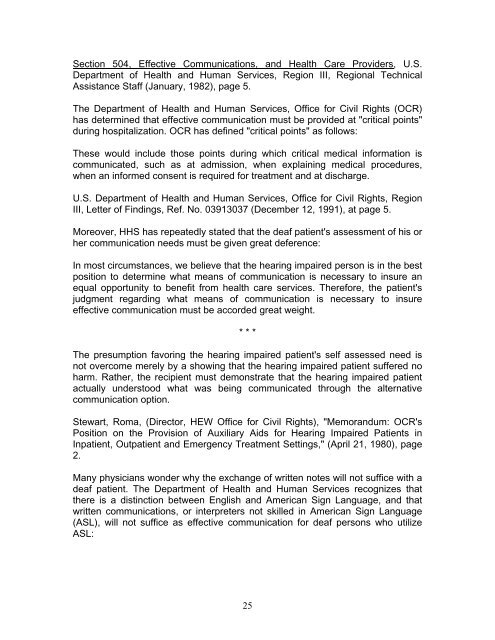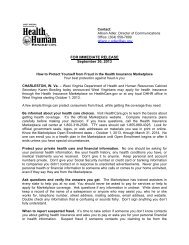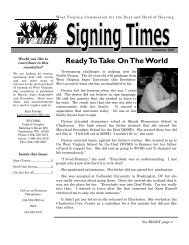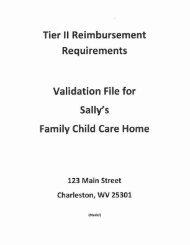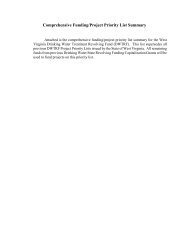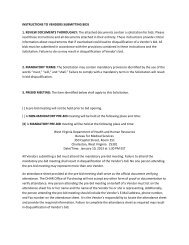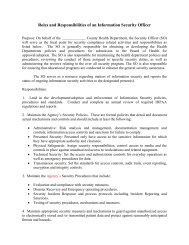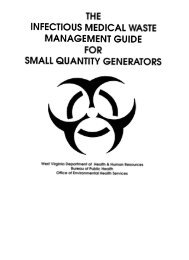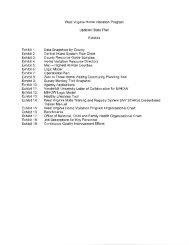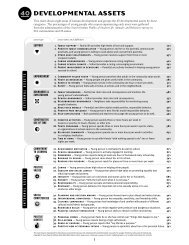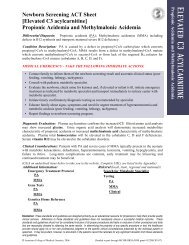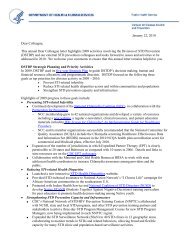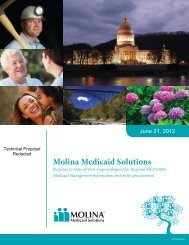Section 504, Effective Communications, <strong>and</strong> Health Care <strong>Provide</strong>rs, U.S.Department <strong>of</strong> Health <strong>and</strong> Human Services, Region III, Regional TechnicalAssistance Staff (January, 1982), page 5.The Department <strong>of</strong> Health <strong>and</strong> Human Services, Office for Civil Rights (OCR)has determined that effective communication must be provided at "critical points"during hospitalization. OCR has defined "critical points" as follows:These would include those points during which critical medical information iscommunicated, such as at admission, when explaining medical procedures,when an informed consent is required for treatment <strong>and</strong> at discharge.U.S. Department <strong>of</strong> Health <strong>and</strong> Human Services, Office for Civil Rights, RegionIII, Letter <strong>of</strong> Findings, Ref. No. 03913037 (December 12, 1991), at page 5.Moreover, HHS has repeatedly stated that the deaf patient's assessment <strong>of</strong> his orher communication needs must be given great deference:In most circumstances, we believe that the hearing impaired person is in the bestposition <strong>to</strong> determine what means <strong>of</strong> communication is necessary <strong>to</strong> insure anequal opportunity <strong>to</strong> benefit from health care services. Therefore, the patient'sjudgment regarding what means <strong>of</strong> communication is necessary <strong>to</strong> insureeffective communication must be accorded great weight.* * *The presumption favoring the hearing impaired patient's self assessed need isnot overcome merely by a showing that the hearing impaired patient suffered noharm. Rather, the recipient must demonstrate that the hearing impaired patientactually unders<strong>to</strong>od what was being communicated through the alternativecommunication option.Stewart, Roma, (Direc<strong>to</strong>r, HEW Office for Civil Rights), "Memor<strong>and</strong>um: OCR'sPosition on the Provision <strong>of</strong> Auxiliary Aids for Hearing Impaired Patients inInpatient, Outpatient <strong>and</strong> Emergency Treatment Settings," (April 21, 1980), page2.Many physicians wonder why the exchange <strong>of</strong> written notes will not suffice with adeaf patient. The Department <strong>of</strong> Health <strong>and</strong> Human Services recognizes thatthere is a distinction between English <strong>and</strong> American Sign Language, <strong>and</strong> thatwritten communications, or interpreters not skilled in American Sign Language(ASL), will not suffice as effective communication for deaf persons who utilizeASL:25
. . . American Sign Language (ASL) [is] a manually communicated languagedistinct from English <strong>and</strong> whose idioms <strong>and</strong> concepts are not directly translatablein<strong>to</strong> English. It uses different sentence structure, grammar <strong>and</strong> syntax thanEnglish, <strong>and</strong> is as much a foreign language <strong>to</strong> English speaking persons as isFrench or German. Conversely, English is equally foreign <strong>to</strong> most deaf personswho rely on ASL for communication. It is a common misconception that "signlanguage" is merely a pan<strong>to</strong>mime <strong>of</strong> the English language <strong>and</strong> is therefore easilyunderst<strong>and</strong>able in print if not audi<strong>to</strong>rily. ASL sentences do not follow Englishsequential patterns. As a result, direct translation <strong>of</strong> English, as with writtennotes, in<strong>to</strong> ASL will not necessarily convey the intended message. Similarly,much <strong>of</strong> English idiomatic speech would be lost on the ASL user whose frame <strong>of</strong>reference for idiom is significantly different from the hearing person.U.S. Department <strong>of</strong> Health <strong>and</strong> Human Services, Office for Civil Rights, RegionIII, Letter <strong>of</strong> Findings, Ref. No. 03913037 (December 12, 1991) page 4.Please note that there is no distinction between in-patient <strong>and</strong> out-patienttreatment. All services provided by health care facilities must be accessible.Americans with Disabilities Act (ADA)In addition <strong>to</strong> hospitals' Section 504 obligations, hospitals, physicians <strong>and</strong> nursinghomes have a federal obligation <strong>to</strong> provide auxiliary aids <strong>and</strong> services <strong>to</strong> disabledpatients under Title II (public hospitals) or Title III (private facilities) <strong>of</strong> theAmericans with Disabilities Act, 42 U.S.C. 12181 et seq. The ADA covers places<strong>of</strong> public accommodation <strong>and</strong> public entities, regardless <strong>of</strong> whether that entityreceives federal financial assistance. The U.S. Department <strong>of</strong> Justice regulation<strong>to</strong> Title III <strong>of</strong> the ADA, 28 C.F.R. Part 36, <strong>and</strong> the Analysis there<strong>to</strong>, 56 Fed. Reg.35544 (July 26, 1991), provide information on the exact nature <strong>of</strong> what will berequired under the ADA. Public accommodations are required <strong>to</strong> provide auxiliaryaids when necessary <strong>to</strong> enable a person with disabilities <strong>to</strong> benefit from theirservices:A public accommodation shall furnish appropriate auxiliary aids <strong>and</strong> serviceswhere necessary <strong>to</strong> ensure effective communication with individuals withdisabilities.28 C.F.R. Š36.303(c). The definition <strong>of</strong> auxiliary aids <strong>and</strong> services includes, fordeaf <strong>and</strong> hard <strong>of</strong> hearing individuals, "qualified interpreters." 28 C.F.R.36.303(b)(1). The definition <strong>of</strong> what constitutes a qualified interpreter is also setforth in this regulation. The U.S. Department <strong>of</strong> Justice has defined "qualifiedinterpreter" <strong>to</strong> mean:. . . an interpreter who is able <strong>to</strong> interpret effectively, accurately <strong>and</strong> impartiallyboth receptively <strong>and</strong> expressively, using any necessary specialized vocabulary.26


